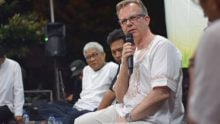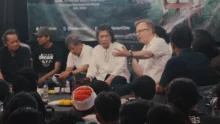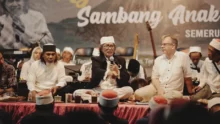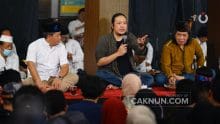Afdlaliyah Maiyah

It’s natural to expect that jammah Maiyah should use the gatherings they attend to ask questions about the state of Indonesia, its socio-political progress and place in the world. It’s natural because there are so many issues to address! But also because the Maiyah movement was born in Indonesia, and initiated in response to a specific set of factors at a time when Indonesia was undergoing a tremendous series of changes. In my view, as a witness to Maiyah for over twenty years, it’s an advantage that the movement has remained outside of the mainstream. Better to let the values of “Tadabbur” and the methodology of “Sinau bareng” permeate slowly through the fabric of society until a critical mass of influence is achieved or a breakthrough endeavour becomes possible, whatever we decide that should be. That’s a thing and a time that the Maiyah leadership and jamaah should control. So I’m not disappointed that Maiyah has not entered the mainstream. I’d be more concerned if it had.
Questions about Indonesia will always arise because despite the successes of the reformasi era, many problems remain. It can be frustrating to realise that there are solutions to these problems within our grasp and that we’ve been discussing them and living them through over twenty years of Maiyah gatherings at Padhang mBulan, Gambang Syafaat, Mocopat Syafaat and Kenduri Cinta. And Mbah Nun has been writing about these problems in his essays and books throughout that time. Yesterday I was in Gunung Agung and I saw the latest series of “Markesot’s” adventures, republished and reprinted. They looked much better than the ones I have on my shelf, which are all looking their age, but each one of those books tells a story, and at the same time teaches a lesson about social and political organisation. When I was researching for the book “Jalan Sunyi Emha” in 2005 and 2006 I read almost all of them, hunting them down in secondhand bookshops and stalls. At Gunung Agung yesterday was also “Renungan Sejarah”, in which Cak Nun looks back and reflects on the course of Indonesia’s most recent historical trajectory. It’s an alternative history, and one that the political elites would not want to recognise or admit to, even though many in the elite claim to be supporters of Mbah Nun and Maiyah. In my view, the history told by these books and by the experience of Maiyah is the “true” history of Indonesia’s reformasi. You won’t find exclusivism here, or intolerance, or a failure to engage. No. Those are the factors that grow and prosper and draw their energy from the mainstream. They are “enabled” by political elites and interest groups who don’t seek change, or who seek only the changes that suit them. At Maiyah you will find constructive engagement, inclusivity, tolerance and a “can do”” attitude. It’s always impresed me that at every Maiyah gathering I attend, the jamaah easily understand the most complex social and political arguments and issues. I never have to worry about not being understood when I talk about difficult subjects and themes. In fact, it’s a challenge for me to keep up with the jamaah and respond to their questions, and that’s how it should be. We could not maintain that degree of intensity if Maiyah were to become fully mainstream. Let’s allow other entities to make up the mainstream. Let Maiyah work with them but grow and develop within it’s own field of energy.
Those books of Mbah Nun serve both as Maiyah’s classroom whiteboard and as its socio-cultural and theoretical framework. We can trace our progress through reformasi through each of them. Each one provides a snapshot of the period when it was written. Ironically, among the best is one of the least well known of these books, The Nation of the Laughing People. This was a slim book produced in the mid-2000s for use on Kiai Kanjeng’s tours to the UK. It tells funny stories about the political life of Indonesia at that time, Ibu Mega, Gus Dur and much, much more, and Mbah Nun’s interactions with them at the time. It’s very funny! Do try to find it! But you won’t find it in the mainstream. I read one highly-respected work on Indonesia’s modern history a while ago. Mbah Nun was referred to only in the footnotes. It’s a case where everyone seems to have forgotten the name of the architect who built their house, in their rush to put their own name on the door. I was lucky enough to be there when some of those political developments were happening, day by day, hour by hour, sometimes minute by minute in the time before the internet, when communications were made in a frenzy of sms text messages. History was being made. Mbah Nun was making it. His books tell the story. If you read them, you might understand why Maiyah is not in the mainstream, and perhaps you’ll agree that it need not be.
On Friday night at Kenduri Cinta, 14 February, Mbak Via told the story of how she and Mbah Nun had met and their journey towards becoming a family. There were lots of jokes and funny moments, but it made me realise that everyone has his or her own pathway to Maiyah, and that Mbak Via’s recounting of her decision to take the hijab and on whether to perform or not to perform was a life journey like many others would have experienced. She talked about her life choices, and how she had taken them herself, without pressure from Mbah Nun, but only with his support.
Each one of us has made choices and taken paths that have ultimately brought us to Maiyah, and each one of us is different. When I am invited to speak at Maiyah gatherings I always smile to myself when I look out and see the diversity of the “jamaah”. Men, women young, old, hijab, cadar and none. And it makes me wonder how and why each one of them came to Maiyah, how they experience it and what they do with it. Because what we do with Maiyah is ultimately what Maiyah is all about. And that’s a reason for optimism.
On Friday night at Kenduri Cinta Mbah Nun and Mbak Via reminded us that they have toured and performed in 26 countries. That’s an incredible achievement for a movement that is not part of the mainstream. But it’s an indication of the interest in Maiyah, and the respect in which it is held overseas. Academics, politicians and artists abroad have often demonstrated greater affection for and given more space to Mbah Nun, Kiai Kanjeng and Maiyah than have any of their counterparts in Indonesia. If the values of Maiyah can achieve that level of acceptance and influence, then Maiyah does not need to be part of the mainstream.
Later this year, as Mbah Nun mentioned at Kenduri Cinta, there will be a major gathering in Europe where Maiyah will be discussed and the applicability of its values to finding solutions for some of the biggest problems facing the world will be explored: the impacts of climate, the challenges to security and much more. Spending a lot of time overseas and seeing how the application of Maiyah values to so many problematic situations in the world makes me confident that the concept of Sinar Bareng will make Maiyah a beacon, the mercusuar mentioned in the notes to Kenduri Cinta’s Afdlaliyah Maiyah. I have seen it happen often during the years of my own Maiyah journey. But we’ll tell those stories again another time…
I will stress that there is no need to be pessimistic about the path that Maiyah has taken. We can all continue to apply its values in our own individual surroundings. The results might not be immediate, but they will come. Whether you are a student, a teacher, an employee, a trader, a housewife or a professional, you have a part to play and your own Maiyah path. You can colour your surroundings with the values of Maiyah and apply its lessons of conflict management to your own lives. It’s incredibly valuable and in doing so you’ll be doing what Mbah Nun and Kiai Kanjeng do at the national and international level.
All these things should restore our optimism in the role that Maiyah can play in Indonesia, and make us feel more optimistic about Indonesia. It’s clear that Maiyah has played a role in Indonesia’s development, even if we can’t see it. But it’s there. Indonesia is a part of each Maiyah follower, that’s why questions about it will always arise, and it’s why Indonesia will never be able to ignore Maiyah.
The notes to Afdlaliyah Maiyah referred to democracy, power and interests. We have to contend with these in Indonesia and everywhere. Some of the best in Indonesia is reflected in the values that Maiyah attempts to cultivate. Togetherness, oneness, the potential for level debate and deliberation, real and genuine participation, the process of deconstruction that precedes every successful engagement, a deep spiritual purpose, an emphasis on humanism and personal faith. Belief in the successful application of these qualities means I never lose hope, and I never fear that the flower that is Maiyah will “die on the vine” before it’s had a chance to truly bloom.
Thinking back on Mbak Via’s story at Kenduri Cinta on Friday night, I’ll recount one final anecdote: In the days before the internet I wrote letters to publishers and made many phone calls to find Mbah Nun’s address, so I could meet him and talk about his books and work. I thought I’d never make it. But then I received word that I should go to an address one evening in Kelapa Gading. I went. No-one was there. I got a bit worried. Eventually I took a call asking me if I was there and that I should wait. It was the early days of big mobile phones, and no WhatsApp. Eventually someone came and took me to another house. There was Cak Nun, and Mbak Via, pregnant with their first child. That evening was an adventure. I’ll tell you more about it next time. But it made me think that I would not have appreciated it so much if it had been easy, if I hadn’t had to work to get there, to wait, to doubt, and to lose a little bit of hope on the way. That’s what made it worth it…










